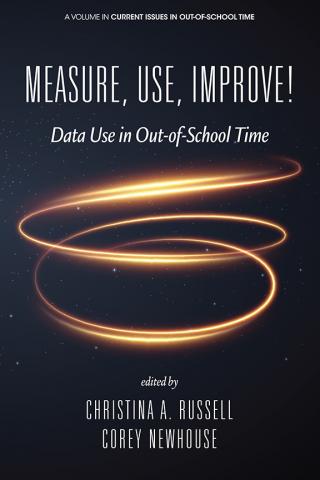Just Released! Measure, Use, Improve! Data Use in Out-of-School Time
Jocelyn Wiedow from Sprockets and Jennifer Griffin-Wiesner from Ignite Afterschool co-author the chapter Building Evaluative Thinking Skills and Capacity through M3. Read more below.
Measure, Use, Improve! Data Use in Out-of-School Time shares the experience and wisdom from a broad cross-section of out-of-school time professionals, ranging from internal evaluators, to funders, to researchers, to policy advocates. The book’s chapters touch on a range of topics, including how to build support for learning and evaluation within out-of-school time programs, creating and sustaining continuous quality improvement efforts, authentically engaging young people in evaluation, and securing funder support for learning and evaluation.
Measure, Use, Improve! offers a guide for building a system of evaluation, with resources and ideas for evaluators and out-of-school organizations just getting started on their data journeys, and for those seeking to build and apply new knowledge to program improvement. The book’s authors share conceptual frameworks that have helped inform their thinking, walk through practical examples of how data in out-of-school time has strengthened their organizations, and offer advice to colleagues.
Building Evaluative Thinking Skills and Capacity through M3
This chapter shares how Ignite, Minnesota’s Statewide Afterschool Network, supports youth development practitioners, programs and systems at the powerful intersection between building evaluative thinking skills and using multiple types of data to understand and improve program implementation and impact. We know that observable quality + positive youth and staff experience + consistent participation = better youth outcomes. Looking at data from each piece of the puzzle separately, however, can overwhelm, lead to frustration, and even confusion about where to invest time, energy and other resources. When we align data collection within those four areas a broader, more comprehensive picture emerges. Then, bringing together a team of diverse stakeholders to make meaning of the data creates an opportunity to build evaluative thinking skills—emphasizing moving from doing evaluation to being evaluative— and helps programs identify where to prioritize their efforts based on the story the data is telling them and whether the data intersects to support or challenge assumptions of staff. Ultimately, investment in continuous program improvement grows. We will share testimony from providers around how approaching data in this way has changed how they look at data collection, stakeholder involvement in data informed decision making, and continuous program improvement.
Authors:
Jocelyn Weiner, Sprockets St. Paul, Jennifer Griffin-Wiesner, Ignite After School

